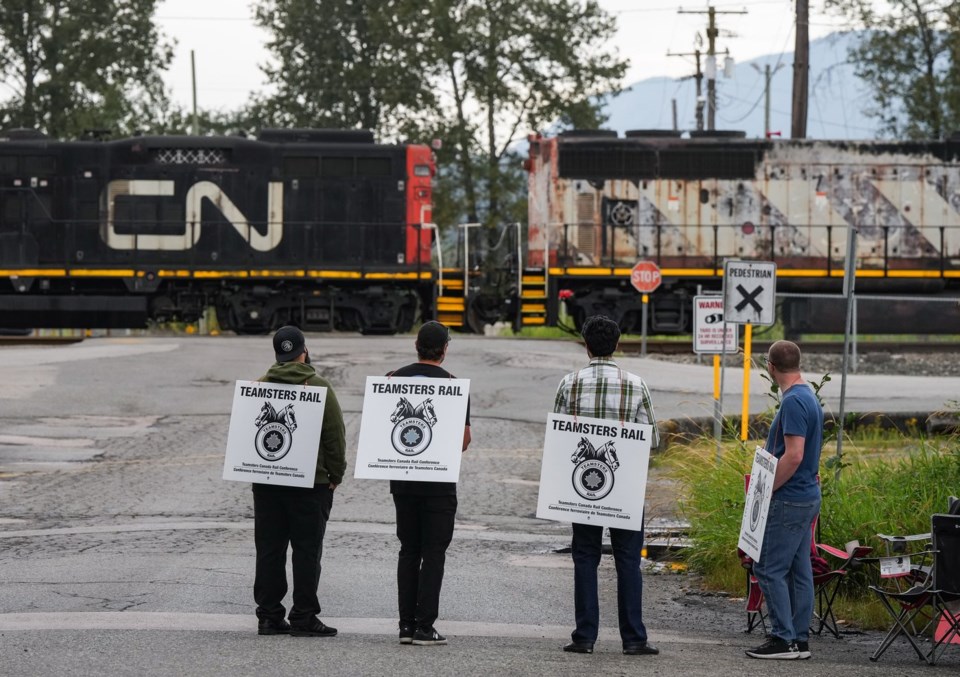MONTREAL — The federal government's directive to end the countrywide rail shutdown in August marked an "unprecedented" move, says Canada's labour tribunal, signalling a stauncher approach to disputes that rarely see direct intervention from cabinet.
Labour Minister Steven MacKinnon's instruction that the Canada Industrial Relations Board halt work stoppages and begin binding arbitration amounted to an order, the quasi-judicial body said in a new document explaining its earlier ruling.
"These ministerial directions are unprecedented in that ... the minister has effectively directed the board to end the strikes and/or lockouts and to impose final and binding interest arbitration to settle the terms of the collective agreements," wrote chairwoman Ginette Brazeau in a unanimous decision released Tuesday.
However, the tribunal also said the labour minister was simply using his "discretionary powers" under the Canada Labour Code, and that the board had no leeway to refuse the directive.
Union members and labour advocates have criticized the move, saying it undermined workers' negotiating leverage and bargaining rights.
MacKinnon has said he supports collective bargaining but that the directive was needed to limit the fallout of a work stoppage that halted freight and commuter traffic across the country.
On Aug. 22, Canadian National Railway Co. and Canadian Pacific Kansas City Ltd. locked out some 9,300 engineers, conductors and yard workers in anticipation of potential job action.
The shutdowns ranged from one to four days and capped off a two-week operational wind-down from coast to coast, marking the first time in decades the country's two major railways were stopped at the same time.
Following the minister's directive, the tribunal ruled on Aug. 24 that freight trains must start rolling again and imposed binding arbitration on all parties involved, in spite of a challenge from the Teamsters Canada Rail Conference.
The union has launched a court challenge to the board's decision.
In his order, MacKinnon drew on Section 107 of the Canada Labour Code. The provision allows the labour minister to “direct the board to do such things as the minister deems necessary ... to maintain or secure industrial peace” — such as ending a work stoppage via binding arbitration.
The tribunal said Tuesday the provision has been used "sparingly" over the past two decades. Its records indicate only 10 other examples since 1984.
The decision carried an undertone of skepticism while also stating that the board had no authority to challenge or change the minister's directive.
"One can certainly question whether it was Parliament’s intent, when it modified Section 107 of the Code in 1984, that a ministerial direction would be used to end a work stoppage and order workers back to work," the members wrote.
"The assessment of whether the minister appropriately exercised that discretion and made that determination within the applicable legal constraints falls under the exclusive jurisdiction of the (Federal Court)."
The board also pointed to a pair of task forces from 1968 and 1995 that rejected the idea of handing authority to cabinet or the labour minister to intervene in public interest disputes.
Instead, the experts recommended creating an "external and standalone body" to advise the minister on the best way to step in, including when to resort to back-to-work legislation — a more democratic forum than a sole cabinet member or executive body — the tribunal said Tuesday.
The unprecedented part of Mackinnon's directive stems from its concrete instructions and lack of wiggle room for the tribunal.
"In the present matters, the minister was explicit in his direction to the board to order the resumption of operations and the return to work of employees. He further directed the board to extend the terms of the existing collective agreements, thereby foreclosing the period for a work stoppage while also providing for the imposition of binding interest arbitration to settle the terms of the new collective agreements," the tribunal wrote.
"There was no ambiguity in this."
The government may have learned its lesson after a looser directive from then-labour minister Seamus O'Regan during a strike by WestJet mechanics in June resulted in a ruling for binding arbitration — but failed to halt the job action.
The tribunal said in that case that the government never technically barred a strike, allowing workers to maintain the work stoppage that grounded flights until a deal was reached at the bargaining table.
This report by The Canadian Press was first published Oct. 22, 2024.
Companies in this story: (TSX:CNR, TSX:CP)
Christopher Reynolds, The Canadian Press



